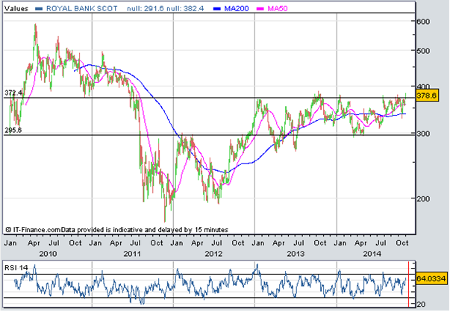Has rallying RBS hit a ceiling?
31st October 2014 13:43
by Lee Wild from interactive investor
Share on
impressed the market Friday with a third consecutive quarter of profits. A chunky impairment charge was still lower-than-expected and both revenue and costs beat forecasts. True, we had heavy hints a few weeks ago, but these are still good numbers. Whether they're enough to justify a premium rating to peers, however, remains to be seen.
An underlying operating profit of £2.2 billion was 10% better than consensus estimates, and statutory pre-tax profit, which includes £801 million added back to the bottom line from the internal bad bank and Ulster Bank, nudged £1.3 billion. This time last year RBS lost £634 million.
Adjusted operating costs fell 5% to £2.9 billion, which includes £780 million of litigation and conduct costs - £400 million to cover possible fines for rigging FX rates and another £100 million of PPI claims.

Elsewhere, tangible net asset value (TNAV) grew to 388p from 376p in June, the common equity Tier 1 (CET1) capital ratio is up 70 basis points on the previous quarter at 10.8%, and the leverage ratio improved by 20 basis points to 3.9%.
At 379p, RBS is trading on 1 times TNAV and 17 times core earnings per share (EPS) forecasts for 2015, "so looks interesting on TNAV and expensive on earnings," thinks Deutsche Bank. "The sooner the remaining legacy issues are settled - FX and FHFA being the larger two is our hunch - the sooner the bank's planned net capital generation can be better assessed and valued."
RBS has had a good run since May, up about 29% to a 12-month high and the top of its recent range (see chart). Much is already in the price, but RBS is one of the most geared UK banks to a rising rate environment, and an improving domestic economy will only hasten progress there.
This article is for information and discussion purposes only and does not form a recommendation to invest or otherwise. The value of an investment may fall. The investments referred to in this article may not be suitable for all investors, and if in doubt, an investor should seek advice from a qualified investment adviser.